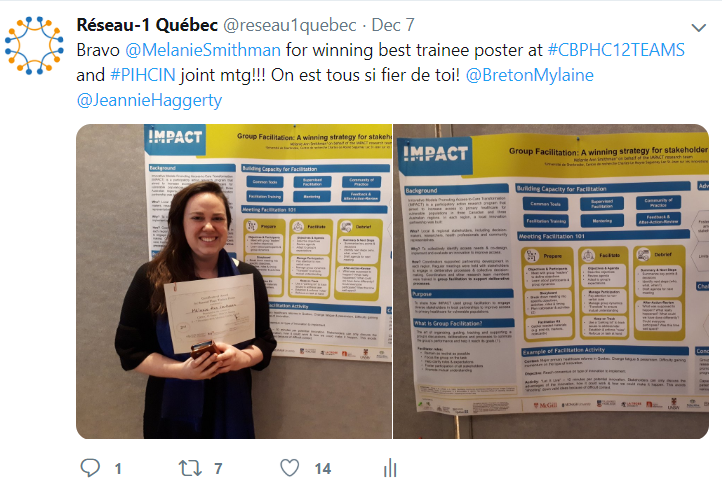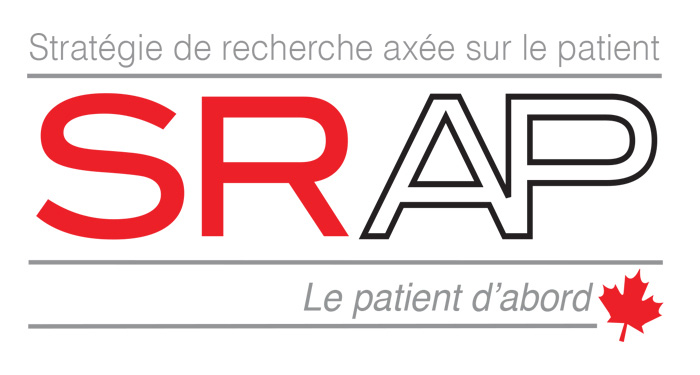Voici le discours que Karina Prévost, patiente-partenaire du R1Q, a présenté lors du panel de cliniciens et patients-partenaires à la Rencontre conjointe des 12 équipes d’innovation en soins de santé communautaire de première ligne et le Réseau de la SRAP sur les innovations en soins de santé de première ligne et intégrés les 6 et 7 décembre 2018 à Montréal.
Voici le discours en français.
Nous la remercions d’avoir partagé son expérience et sa perspective si riche et inspirante!
———————-
Hello everyone, my name is Karina Prevost. I am a patient partner from Québec.
I am currently a member of Réseau-1 Québec’s executive committee and I sit on the PIHCIN* tripartite committee in Québec as patient co-lead with Véronique Sabourin. I would like to acknowledge the fact that this amazing team has worked with patients as partners since the very beginning. I thank them for that.
So, reflecting on yesterday’s discussions, what have I learned, as a patient, and how could I, as a patient, be involved in knowledge translation and exchange (KTE)?
I can’t help it, I feel the need to bounce back on the beautiful speech Dr. Moira Stewart gave yesterday. This particular phrase stuck in my head: “Patients are your northern star.” It was such a strong and powerful image: us, patients and citizens, being this bright shining star in the sky. I sincerely understood that working for patients should always be remembered as the ultimate goal. Well said Dr. Stewart! We do want to see great quality care for people all across Canada. That being said, a star might be really bright and shiny, BUT it is at a very great distance. It is something we can look at, but yet, unattainable. Is that really how we should see patients?
Let me propose a patient’s perspective: As PIHCIN comes into its 2.0 phase, let’s say we are about to embark on a new expedition. Let’s consider how patients could be involved in KTE. From my perspective, I am not the one to tell you how we could be involved in KTE because it is your field of expertise. But I can tell you what we have to offer as patient partners. My request, to all of you, is to allow yourself to think out of the box, to let us be part of your journey. Let’s walk hand in hand. Of course, if I was to be part of your trip, I would be the slow one, sometimes getting on your nerves because I come from a different background and I do walk with a very heavy backpack. But the content of this really heavy bag can come in handy at times, especially when it comes to patient partnership.
I come with experience that cannot be acquired with scientific knowledge. You all have studied hard, you have impressive backgrounds. As a patient, I have been part of the health care system continuously for the past 40 years. I am part of a community, yes, as a patient, but let’s not forget, as a person. I have taken care of my dad and my little sister who both passed away 10 years ago. I have worked with Syrian refugees for more than 2 years. I have lived all my life with cystic fibrosis and I received a double lung transplant 4 years ago. Sharing my experiential knowledge allows me to offer another perspective to very smart people. What I can offer is unique and doesn’t come in any books.
Because of who I am and what I am as a patient, I have been a strong advocate for my peers. We are great partners when it comes to communication. We are very active on many platforms: Facebook, Instagram, Twitter. Patients do talk to patients. We can help with interviews, group discussions, focus groups, surveys, etc.
Yes, we do know a lot of people, we also have strong bonds within our patient advocacy groups and because we’ve been living with health care problems for so long, decision makers are more and more inclined to listen to what we have to say, especially when it comes to our care management.
Of course, we are patient-focused, that is why we are here! But we are fully aware that the implementation of innovations needs to be cost effective, that practitioners are very busy people, that funding is always a big part of the equation.
Patient partners do not come in to answer to very complex issues, but, as I often like to say, I feel we are part of the puzzle. And we’ve been the one missing for a very long time. I like to think we offer a new way of thinking. Please, as we get into PIHCIN 2.0, remember that patient partners are there to work with you.
Let’s work with patients, for patients, for all Canadians.
Thank you.
*PIHCIN = Pan-Canadian SPOR Network in Primary and Integrated Health Care Innovations (Réseau pancanadien de la SRAP sur les innovations en soins de santé de première ligne et intégrés, voir : http://reseau1quebec.ca/apercu/)







